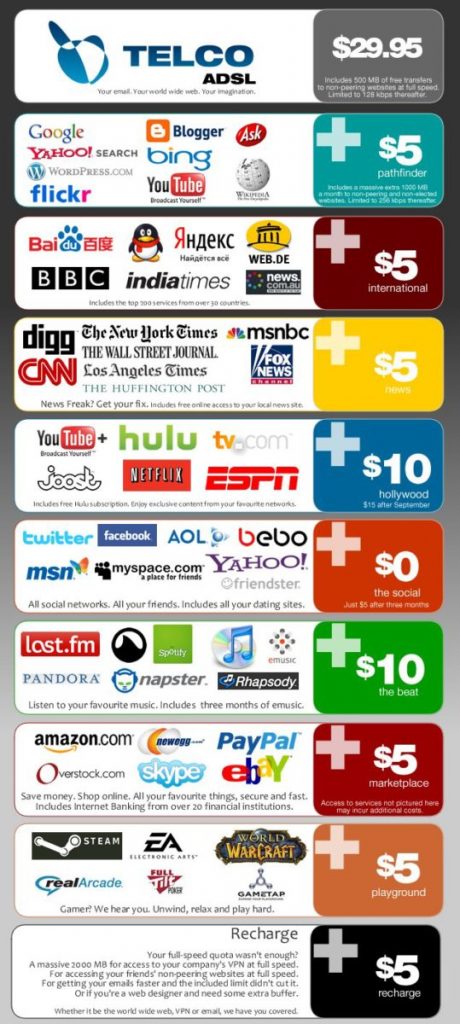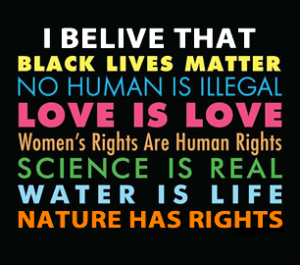Why the Internet and Net Neutrality Need Defending
In case you haven’t already heard the news, there was an important legal verdict handed down recently from the US Court of Appeals in DC having to do with net neutrality and broadband internet non-discrimination rules and regulations from the Federal Communications Commission (FCC). The case, Verizon Communications v. the FCC was challenging the FCC’s 2010 order imposing network neutrality regulations on broadband service. In short, the Court said the FCC had the right to regulate the Internet, but was using the wrong authority to do it in this case, since broadband services are classified differently than other “common carrier” services like telephone and cable TV. By all accounts, the ruling is a major victory for corporate media giants, who fought tooth and nail against any Net Neutrality restrictions in the first place, and a huge blow to Internet freedom for the average Jane or Joe. So why does the Court of Appeals ruling have so many internet activists and consumer safety advocates panicking, while folks at free market think-tanks like the American Enterprise Institute (AEI) are celebrating? In short, it has to do with choice and profits–who chooses and who profits.
I won’t go into all of the ins-and-outs of communications law and net neutrality here, but if you want to learn more take a look at this Net Neutrality Primer from the Free Press. The important point is that in the coming months and years we may start seeing a shift in internet media practices and how they are accessed by and offered to the public. In the future we could start to see impacts on streaming services or anything that uses dedicated bandwidth–think streaming content providers like Netflix, online gaming servers like Steam or torrent file sharing a la Pirate Bay. And we could also see the creation of elite content zones, with bigger price tags and fatter data pipes serving data faster in the form of “sponsored data.”
These kind of services generally use far more broadband than just surfing the web, but the ability to access these services is only contingent–in the case of paid products like Netflix, on a basic user fee–or in the case of torrents, on having basic Internet access. You pay a standard monthly fee to get online, likely to Time Warner if you live in New York like I do, or some similar ISP, and then off you go. You can happily slurp up as much Internet bandwidth as you please getting lost in cute kittens on YouTube. And if you are a Netflix (or similar service) user like me, you might also pay an extra monthly fee for unlimited streaming content. As Matt Cantor of Newser writes, “If ISPs start making Netflix, for instance, pay a usage fee to maintain speedy content delivery, that cost could make a serious dent in its profits—or trickle down to consumers.” We all know that when prices increase, the consumers pay for it. But all that could be about to change without the basic safety net that is Net Neutrality. In effect, without these rules on the books, consumers can now be charged for access to the content as well as accessing the content. This is a subtle but critical distinction, and includes more than just Internet bandwidth issues. It’s like having a Blackberry that connects twice as fast to Facebook as your friend on their iPhone because you have AT&T and they have Verizon. That’s how things could start to change.
For an example of how this might impact gamers, check out dieselfrost’s video about the Call of Duty: Ghosts game and how its fan base could be impacted without Net Neutrality. His analogy of the roads is particularly useful here, since it is something most people already understand as a frame of reference and we tend to talk about Internet “traffic.”
If you’re more of the nuanced detail type, you might want to listen to the Diane Rehm show on this issue as well. There is also an interesting political backstory for you politics junkies like me, which has to do with Bush-era politicking under former FCC Chairman Michael Powell. You’d never guess where Powell is now! CNET also has an excellent piece worth reading, which lays out in pretty simple language why Net Neutrality matters to the average Internet user. Newser also has a good big-picture take on this that is worth reading. And then there is this great graphic from reddit user quink that makes this pay to play idea all really easy to understand in context. Sometimes a picture is worth a thousand words.
 As Rich Greenfield wrote back in 2006 in his introduction to the net neutrality debate:
As Rich Greenfield wrote back in 2006 in his introduction to the net neutrality debate:
“Todays telcos seem to have little obligation to—and even less interest in—universal service. Instead, in pursuit of the best return on investment so that their proprietary broadband networks can be deployed quickly, the incumbent telcos are concentrating on who can pay and how much, tiering their services to saturate the market at the highest prices it will bear.”
That’s precisely the strategy being touted today by corporate media apologists like Jeffrey Eisenach, Director of AEI’s Center for Internet, Communications, and Technology Policy (CICT):
“While the Court’s discussion of Internet economics leaves much to be desired, its ultimate conclusion — which leaves in place the freedom to innovate which has applied to the Internet since its inception – is good for consumers, for innovation and for economic growth. It is clear that we still have a lot of work to do explaining the economics of competition in high-tech industries to the DC Circuit.”
The claim that throwing out Net Neutrality—aka Internet non-discrimination—is “good for consumers, for innovation and for economic growth” is a sad and crass kind of cut-and-paste capitalism (markets = always good, regulations = always bad) that only thinks in terms of profits and totally ignores the public and communicative aspects of the Internet that make it a public good. The position advanced by Eisenach and others amounts to saying that more choices are always better. John Herrman at BuzzFeed explains why these changes seem like a good thing on the surface:
“What if you didn’t have to pay for your data plan? What if the biggest data hogs on your phone — your music apps, your streaming video apps — didn’t count toward your monthly limit? It’s an intoxicating pitch, and one you’ll hear soon.”
I call the logic behind this kind of choice the nail polish argument—just because you can choose from 1,000 different colors of nail polish doesn’t mean you have any meaningful choice about the nail polish itself—like whether animals died to develop it. It’s the illusion of choice through quantity, a trick Walmart has perfected to an art form, where more is automatically better. And as Herrman notes, “We may be entering the era of sponsored data — the era of an internet that we don’t directly pay for, but that we also don’t control. It’s the old net neutrality nightmare, in other words, disguised as a gift.”
The same is true in this case, where more paid Internet services is equated with more freedom to choose, while ignoring the fact that the supposedly “new” choices are really what we already pay for, not anything new, which have now been cut apart and priced separately. It’s kind of like cutting off the ends of a loaf of bread and then selling two kinds of bread, with ends or without ends, and charging more for the whole loaf with ends while claiming you provide more “bread services” for the consumers to choose from. Again, it’s an artificially constructed choice but it carries a real price, and that’s precisely why the big media players are so against net neutrality and so happy about this ruling. Now they can start to slice up the broadband media loaf and sell us the crusts and crumbs too!
Now, the one upside to all this is that the Court did make it clear that the FCC could have the power to implement the net neutrality rules, but it would need to change how it defines broadband service providers to include them under existing media providers, a point made by one of the guests in the Diana Rehm show. So if the FCC wanted to, it would be able to simply change its language and make broadband providers fall under the same “common carrier” regulations as existing service providers.
If or how that will happen remains to be seen, and will be one of the options that I am sure people will be watching for on both sides of this debate. Until that time, the best we can do is let the FCC and Congress know that we value net neutrality and want them to make the necessary “reclassifications” to keep the Internet free. So hop on over to Save the Internet and sign their petition and find out more about how you can have your voice heard and stand up for an open Internet before it is too late.


